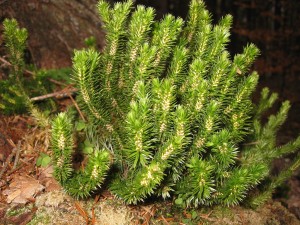Contents
Uses
- Huperzia serrata is used for Alzheimer’s disease and general memory disorders. It is also used for fever, pain and swelling (inflammation), blood loss, and irregular menstrual periods. Some people use it to rid the body of extra fluid by increasing urine production.
Benefits
The primary benefit of Huperzia Serrataand Huperzine A is that it helps to improve memory capacity and access to stored memories. This is certainly true for short-term memory, largely due to an increase in the levels of Acetylcholine.
There is also evidence to support additional effects upon memory systems in the brain and your neurons. For example, studies have also shown that supplementation with Huperzine Serrata can reduce oxidative stress in cholinergic neurons, i.e. those neurons which are part of the Choline and Acetylcholine system. Other studies have indicated that this supplement may improve adolescent memory retention and performance.
There is also significant evidence showing that this supplement may improve cognition in people with memory deficits. This includes helping those with Alzheimer’s disease and vascular dementia (which is perhaps the most common cause of age-related dementia). Other studies have shown that the supplement can provide significant memory improvements even for healthy adults.
As with other Acetylcholine supplements, using Huperzia may also lead to an improved learning capacity. Many also report an increase in attention span, concentration, and focus. There is also evidence supporting the contention that this supplement helps to increase levels of nerve growth factor, which is an important element in the repair and growth of all types of nerve cells. With higher levels of nerve growth factor, your brain will become even more plastic and new neurons may even begin to develop.
Cautions
- There isn’t enough information available to know if Huperzia serrata is safe. It might cause side effects such as dizziness, nausea, and sweating.
Interactions
-
- Drying medications (Anticholinergic drugs) interacts with Huperzia serrata
Chinese club moss contains chemicals that can affect the brain and heart. Some of these drying medications called anticholinergic drugs can also affect the brain and heart. But Chinese club moss works differently than drying medications. Chinese club moss might decrease the effects of drying medications.
Some of these drying medications include atropine, scopolamine, and some medications used for allergies (antihistamines), and for depression (antidepressants). - Medications for Alzheimer’s disease (Acetylcholinesterase (AChE) inhibitors) interacts with Huperzia serrata
Chinese club moss contains a chemical that affects the brain. Medications for Alzheimer’s also affect the brain. Taking Chinese club moss along with medications for Alzheimer’s disease might increase effects and side effects of medications for Alzheimer’s disease. - Various medications used for glaucoma, Alzheimer’s disease, and other conditions (Cholinergic drugs) interacts with Huperzia serrata
Chinese club moss contains a chemical that affects the body. This chemical is similar to some medications used for glaucoma, Alzheimer’s disease and other conditions. Taking Chinese club moss with these medications might increase the chance of side effects.
Some of these medications used for glaucoma, Alzheimer’s disease and other conditions include pilocarpine (Pilocar and others), donepezil (Aricept), tacrine (Cognex), and others.
- Drying medications (Anticholinergic drugs) interacts with Huperzia serrata
Other names
Huperazon, Licopodio Chino, Lycopode Chinois, Lycopodio Chinois, Lycopodium serrata, Qian Ceng Ta, Toothed Clubmoss
References
Nootritment, http://nootriment.com/huperzia-serrata/

